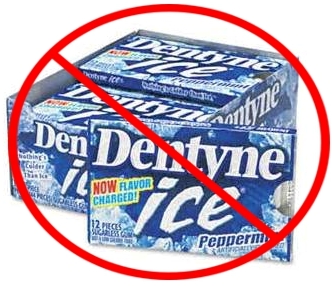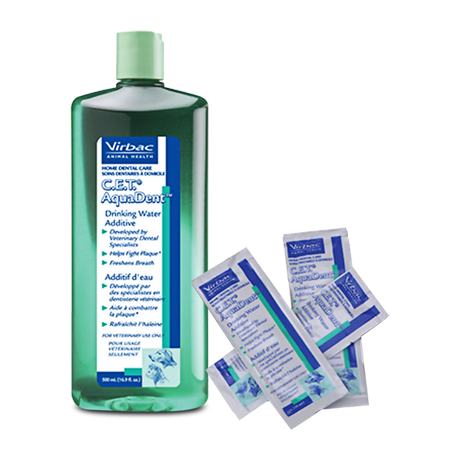[Warning] Common serious dog toxin, xylitol, found in dog mouthwash
The second most common ingredient that is poisoning our dogs is a ‘sugar substitute’ called Xylitol. Not only is it found in sugar free gum, it is also in veterinary dog mouthwashes.
Thousands of dogs each year are poisoned with xylitol.
Effects of Xylitol
1. Hypoglycemia (Low blood sugar)
In the canine body, the pancreas confuses xylitol with real sugar. The result is that blood sugar levels rapidly drop resulting in weakness, disorientation, tremors, and potentially seizures.
It only takes a few sticks of gums. A 10 lb dog could be poisoned by as little as a stick and a half of gum.
Symptoms typically begin within 30 minutes and can last for more than 12 hours. Vomiting and diarrhea may also occur.
2. Liver Damage ( Hepatic necrosis)
In this case much more gum is ingested (APPROX 10 TIMES the amount to cause hypoglycemia). A 10lb dog would be required to ingest an entire pack of gum.
There is actual destruction of liver tissue.
Signs take longer to show up (typically 8-12 hours) and not all dogs that have liver damage ( hepatic necrosis), will have experienced hypoglycemia first.
In some cases there is only mild signs, while with other dogs, a complete and acute liver failure can result with death following. Internal hemorrhage and inability of blood to clot is commonly involved.
Treatment
The ideal treatment is inducing vomiting after consumption, within 30 minutes. After that time, treatment involves supportive care, IV fluids.
Xylitol in Veterinary Mouthwash for Dogs
What about Xylitol Containing Mouthwashes for Dogs?
Seems like a poor idea, yet some of the veterinary drug companies, such as Aquadent® by Virbac, Breathalyser Plus® from Ceva should be avoided.
Others have different opinions, yet if most pet owners, knew what was in these products, they would probaly stop giving them.
My suggestion is to avoid mouthwashes in general- stick with feeding your dog raw bones, carrots, and brushing their teeth if needed.
Best Wishes,
Dr Andrew Jones


I have never used mouthwash for any of my dogs-mouthwash only hides whatever problem causes bad breath in dogs or even humans-there is usually an underlying cause-decayed, broken teeth, some illness etc. I have used parsley for my dog’s bad breath when it was so awful I couldn’t stand it, but a healthy pet should not have obnoxious breath to begin with-keep the mouth healthy and it won’t smell bad-I also feed my dogs raw marrow bones which clean their teeth-common sense should tell people that dogs do not need mouthwash-nor any of the other things that are created to make money from supplying our pets with things they do not need. I am treating my pets, for the most part holistically or naturally-I give charcoal tablets for gas, parsley for bad breath, bones for clean teeth and gums and bathe them in mild soap when they need bathing-the rest of the time I let them be dogs and do things dogs do.
Mouth wash for dogs – unnecessary! I agree, clean their teeth (every other day unless they have poor teeth, then every day until they improve) – it only takes a minute, go easy on the tooth paste, and mine have a raw bone most days after breakfast.
They don’t have bad breath (well the latest member to the Syrett family does have a bit of dog breath but it is improving, but he was in a bad way when I took him in – his teeth were coated in a brown hard covering, the gums smelly and inflamed, but they are good now with a couple of teeth that need special attention). As for gas (or farts as we call them here!), if you get the gut working properly with some lightly boiled greens in their diet,raw meat a few times a week, tinned sardines in oil twice a week plus Dr Jones dog supplement, they don’t have a problem. Mine occasionally “let one go” but apart from the noise – honestly it doesn’t smell.
When I used to write GSD Breed Notes for Dog World I wrote to Virbac and asked them if they knew that xylitol was dangerous for animals to ingest. They replied that they did but amount that they use in their toothpaste and mouthwash is minimal and not enough to be dangerous.
I was horrified when I read a tooth wash I was using contained Xylityol. I did some reading and was still horrified. How can it be safe for your pet? I wonder how long the pharmaceutical company had to test the product for? Weeks, months? Doubt it was very long before the licence was given?
What a ridiculous idea! I’ve had dogs throughout my life and I’ve never ever even thought of using mouthwash on them. If there’s a problem with ‘stinky’ breath then that means there’s an underlying problem somewhere, maybe rotting teeth, or some digestive ailment. I believe mouthwash for both humans and for animals is totally unnecessary if dental hygiene is maintained.
As to these companies deliberately using ingredients that they KNOW are extremely harmful to dogs, well quite frankly I would be giving them a very wide berth, refusing to even consider their products whatever they may be. I rescued a dog who had chronic pancreatitis and it broke my heart to see her when she was in the throes of the disease, there is no way that I would risk inducing a similar condition in any animal.
Mouthwash in a dog’s drinking water is a stupid idea anyway — for mouthwash to work, it has to be held in your mouth and swished around your teeth and gums, then spat out — not quickly swallowed like a drink.
I’ve found that applying a little ordinary 3% hydrogen peroxide with wet gauze along the gum line works marvels for cats with bad breath due to incipient gingivitis, and I guess would work for dogs, too. I’d be interested in your comments on that, Dr. Jones.